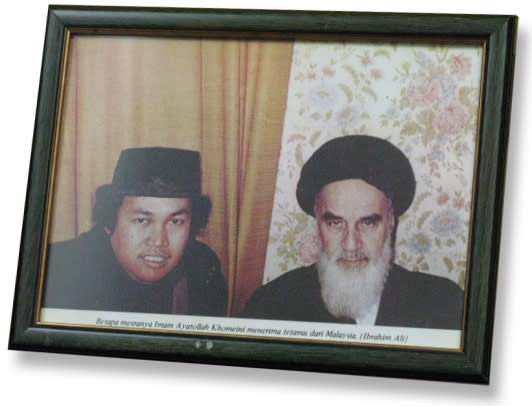Perkasa chief not convinced by Putrajaya’s Shia evidence against Mat Sabu
PAS deputy president Mohamad Sabu may have an unlikely ally in Datuk Ibrahim Ali, leader of the right wing Malay group Perkasa, who doubted the Home Ministry's recent allegation that the veteran PAS leader is a Shia Muslim.
On Thursday, Putrajaya linked Mohamad, popularly known as Mat Sabu, to Shia activities, and cited his admiration for the late Iranian revolutionary leader Ayatollah Khomeini.
But Ibrahim said admiring Iranian leaders is not proof that one is a Shia Muslim.
Ibrahim, one of few Malaysians who met Khomeini in person when the latter lived in exile in France, also dismissed suggestions that he too was a Shia follower as a big joke.
"If I am accused of being a Shia because I met with the Khomeini, it will be the biggest joke as my meeting with anyone cannot be used to say that I follow or agree with their beliefs.
"Admiring Iran's Islamic Revolution has nothing to do with Shia. It was a political fight by the people of Iran against its cruel leader at that time," Ibrahim told The Malaysian Insider in Kuala Lumpur, referring to the Shah of Iran, Mohammad Shah Reza Pahlavi, who was overthrown in the 1979 popular uprising.
On whether Mat Sabu is a Shia, Ibrahim said: "I don't know. It has to be answered by him alone and has nothing to do with my meeting with the Khomeini."
The Home Ministry convened a press conference on Thursday to reveal what it said were evidences to back its minister's claims that Mat Sabu was involved in Shia activities.
Home Minister Datuk Seri Ahmad Zahid Hamidi first made the claim in his capacity as the Umno vice-president during the party's general assembly recently.
Most of the evidences revolved around Mat Sabu's admiration of Khomeini's struggle.

Following that, a picture of Ibrahim posing with Khomeini (left) made its rounds on social networking sites, with netizens questioning whether Ibrahim too was now a Shia.
The ministry cited an article by Mat Sabu published in the PAS organ Harakah in July 2008, in which he urged Muslims to emulate Khomeini's leadership.
However, Ibrahim felt that the Home Ministry should come out with a stronger evidence to back its claim that Mat Sabu is a Shia.
"If meeting with the Khomeini, like I did, is the basis of their accusation, then I wouldn't accuse Mat Sabu of being a Shia follower. But if the ministry has more evidence, I will not interfere with that. They have to show that Mat Sabu has joined in trainings or activities organised by Shia groups," he said.
Ibrahim reminded that former prime minister Tun Abdul Razak had met with Chinese revolutionary leader Mao Tze Tung and had started diplomatic ties with China.
"I do not think that Tun Razak supported the communist ideology.
Tun Dr Mahathir Mohamad also met with Cuban leader Fidel Castro but that does not mean he is a socialist," he argued.
Ibrahim, who was Mat Sabu's college mate at then Institut Teknologi Mara, said he was proud that his meeting with Khomeini was exposed in the social media as many did not believe it took place.
"I was excited that my meeting with Imam Khomeini came up again as people claimed that it was a fake photo when I showed it to them before. Some were not happy that I got to take a photo with him," he added, while naming several world leaders who he met, including Cuban leader Fidel Castro and former US vice-president Al Gore.
He said Khomeini, who was the central figure in the heat of the massive protests against the Shah in Iran, did not like to be photographed.
"The picture was taken in 1978, about 35 years ago. I think I was the only Malaysian who ever got to meet with the Khomeini before the revolution," he said, recalling that the meeting was on the side of his honeymoon.
He said he interviewed Khomeini on the Iranian revolution, a hot topic then, at a place called Neauphle-le-Chateau, an hour's journey from Paris.
Ibrahim recorded the meeting in his 1979 book “Wawancara bersama Ayatollah Khomeini” (Conversation with Ayatollah Khomeini), which he said sold 35,000 copies.
"He talked to me about the cruelty of Mohammad Reza, who was also known as the Shah of Iran. How the leader had embezzled the riches and became America's stooge. That was what we talked about. Nothing about the Shia beliefs," he said.
The Perkasa leader remembered Khomeini as a soft-spoken man, and who only spoke in French and Persian.
"I don't see him as a political fighter. He only went against Mohammad Reza, who was cruel to the people. That's why when the revolution was a success, Khomeini did not become the president but instead went back to Qom and continued preaching," said Ibrahim, referring to the Iranian university town. - December 14, 2013.


